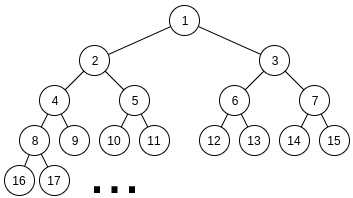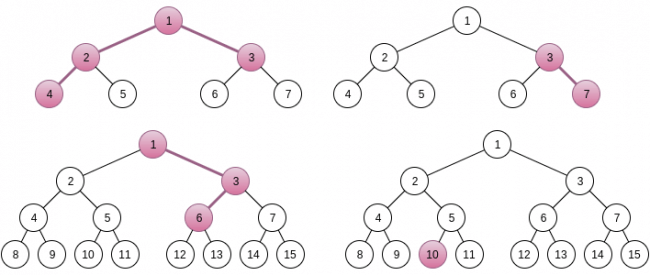The New Year tree is an infinite perfect binary tree rooted in the node 1. Each node v has two children: nodes indexed (2·v) and (2·v + 1).

Polar bears love decorating the New Year tree and Limak is no exception. As he is only a little bear, he was told to decorate only one simple path between some pair of nodes. Though he was given an opportunity to pick the pair himself! Now he wants to know the number of unordered pairs of indices (u, v) ( u ≤ v), such that the sum of indices of all nodes along the simple path between u and v (including endpoints) is equal to s. Can you help him and count this value?
Input
The only line of the input contains a single integer s (1 ≤ s ≤ 1015).
Output
Print one integer, denoting the number of unordered pairs of nodes indices defining simple paths with the sum of indices of vertices equal to s.
Example
input
10
output
4
Note
In sample test, there are 4 paths with the sum of indices equal to 10:

Solution:
#include <bits/stdc++.h>
using namespace std;
const int MAX = 51;
const long long one = 1LL;
const int N = 222;
int d[N];
long long f[N][N][N];
long long x[N];
int main() {
long long real_s;
cin >> real_s;
long long ans = 0;
for (int h1 = 1; h1 <= MAX; h1++) {
for (int h2 = h1; h2 <= MAX; h2++) {
for (int lca = 1; lca <= h1; lca++) {
if (h1 == lca) {
long long s = real_s;
x[0] = 1;
for (int i = 1; i < h2; i++) {
x[i] = x[i - 1] * 2 + (i <= h2 - lca);
}
if (s < x[h2 - 1]) {
continue;
}
s -= x[h2 - 1];
for (int i = h2 - 2; i >= 0; i--) {
if (s >= x[i]) {
s -= x[i];
}
}
if (s == 0) {
ans++;
}
continue;
}
// lca < h1 <= h2
for (int rot = 0; rot < 1 + (h1 != h2); rot++) {
long long s = real_s;
if (rot == 0) {
s -= (one << (h1 - lca)) - 1;
} else {
s -= (one << (h2 - lca)) - 1;
}
if (s < 0) {
continue;
}
long long first_lca = (one << (h1 - lca + 1)) + (one << (h2 - lca + 1)) - 3;
long long last_lca = (first_lca << (lca - 1));
s -= last_lca;
if (s < 0) {
continue;
}
for (int j = lca - 2; j >= 0; j--) {
long long cur_lca = (first_lca << j);
if (s >= cur_lca) {
s -= cur_lca;
}
}
long long can_get = 0;
int guys = 0;
for (int i = 1; i <= h1 - lca - 1; i++) {
can_get += (one << i) - 1;
guys++;
}
for (int i = 1; i <= h2 - lca - 1; i++) {
can_get += (one << i) - 1;
guys++;
}
if (s > can_get) {
continue;
}
int kd = 0;
while (s > 0) {
d[kd++] = s % 2;
s /= 2;
}
for (int pos = 0; pos <= kd; pos++) {
for (int carry = 0; carry <= 2 * guys; carry++) {
for (int cnt = 0; cnt <= guys; cnt++) {
f[pos][carry][cnt] = 0;
}
}
}
for (int cnt = 0; cnt <= guys; cnt++) {
f[0][0][cnt] = 1;
}
for (int pos = 0; pos <= kd; pos++) {
for (int carry = 0; carry <= 2 * guys; carry++) {
for (int cnt = 0; cnt <= guys; cnt++) {
long long ft = f[pos][carry][cnt];
if (ft == 0) {
continue;
}
if (pos == kd) {
if (carry == 0 && cnt == 0) {
ans += ft;
}
continue;
}
int new_carry = carry + cnt;
if ((new_carry & 1) != d[pos]) {
continue;
}
new_carry >>= 1;
int ways = (pos < h1 - lca - 1) + (pos < h2 - lca - 1);
for (int ending = 0; ending <= ways && ending <= cnt; ending++) {
f[pos + 1][new_carry][cnt - ending] += ft * ((ways == 2 && ending == 1) ? 2 : 1);
}
}
}
}
}
}
}
}
cout << ans << endl;
return 0;
}

